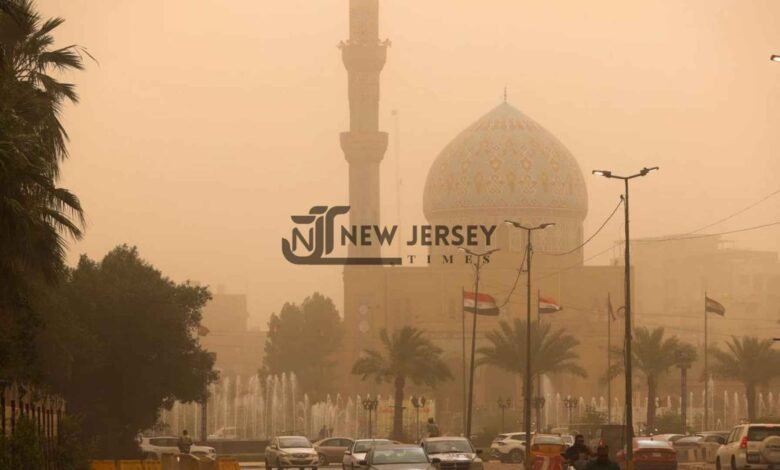
Washington/Baghdad, June 11: The US Iraq embassy evacuation began quietly this week, as American officials authorized the departure of non-essential personnel from the Baghdad mission amid growing concerns over regional security threats. The move, confirmed by multiple sources on Wednesday, comes alongside the Pentagon’s approval for voluntary exits by military families based across the Gulf.
Several U.S. and Iraqi officials, speaking under condition of anonymity, confirmed the decision on Wednesday. The State Department described it as precautionary and tied to “a recent review,” but declined to say what prompted the timing.
A Calculated Step, Not A Sudden Exit
No sirens, no armored convoys. The departure, officials stressed, is structured and commercial—relying on airlines rather than military lifts. But the symbolism is difficult to ignore. In a region prone to spiraling flashpoints, even partial withdrawals carry messages.
One embassy source described the tone inside Baghdad’s diplomatic compound as “measured, not panicked,” adding, “Nobody wants to be caught off guard.”
An Iraqi foreign ministry official confirmed the development, citing “potential security concerns linked to regional volatility.” Though light on details, the statement aligns with growing unease about Iran-backed militias, Israeli airstrikes, and the faltering Iran nuclear talks.
Across The Gulf, Military Families Offered Exit Option
While the Baghdad decision dominated headlines, a second move—less visible, but telling—also came into effect: military dependents stationed in Bahrain, Kuwait, Qatar, and the UAE have been granted permission to leave if they wish.
According to U.S. defense officials, this directive is most relevant in Bahrain, home to the U.S. Navy’s Fifth Fleet and the largest concentration of American families in the Gulf. There is, as of now, no order—only an option. But in military planning, voluntary departures are often a prelude to more definitive steps.
At Al Udeid Air Base in Qatar, operations remain unchanged, and officials there emphasized that no drawdown has been ordered.
Pressure Mounts As Regional Fires Grow Hotter
The backdrop to all of this is, of course, increasingly combustible. The war in Gaza, which erupted in October last year, has reshaped the strategic picture. Attacks on U.S. positions in Iraq and Syria have surged. Most are attributed to groups aligned with Tehran, though formal responsibility is rarely claimed.
On Wednesday, former President Donald Trump said he had “little faith” left in Iran’s willingness to reach a nuclear accord. Hours later, Iranian Defense Minister Aziz Nasirzadeh fired back, warning of retaliation if Iranian territory or personnel came under attack.
In a separate post, Iran’s mission to the United Nations accused Washington of “militarism” and insisted Tehran was not seeking nuclear arms. The language was familiar, but the tone—according to diplomats monitoring the file—was sharper than usual.
Markets React as Oil Prices Climb
The ripple effects extended into the markets. Global oil prices, already skittish, jumped on reports of the embassy drawdown. Brent crude futures rose by more than 4%, closing near $69.18 a barrel—a reflection of mounting fears over supply disruptions should the region slide further into confrontation.
Adding to that concern, the UK Maritime Trade Operations (UKMTO) issued an alert for commercial vessels transiting the Strait of Hormuz, Gulf of Oman, and Persian Gulf. The warning cited the potential for military escalation and urged shipping operators to proceed with “heightened vigilance.”
These are not new waters for tanker fleets—but in the current climate, the alert drew more attention than usual.
A Delicate Balance In Baghdad
For Iraq, the optics are complicated. It remains one of the few governments maintaining reasonably open channels with both Washington and Tehran. But that balancing act has become more precarious since the Gaza conflict began.
Iraq hosts roughly 2,500 U.S. troops, many of them focused on counter-terror operations. At the same time, elements within its own security structure remain aligned with Iran’s strategic objectives. Several attacks on American positions over the past year were traced to factions that operate—at least nominally—under the Iraqi government’s command.
Baghdad’s official response has been muted. But behind the scenes, sources suggest contingency discussions have begun—both to protect foreign embassies and to avoid being drawn deeper into a potential U.S.-Iran standoff.
Strategic Retrenchment, Not Retreat
American officials were at pains to frame the move as strategic, not reactionary. There is no broad withdrawal underway, no shift in military posture. What’s happening instead is something more incremental: a trimming of exposure, a hedging of bets.
“It’s not about losing ground,” one Pentagon advisor said. “It’s about staying mobile.”
Even so, for those who’ve watched similar scenarios unfold over the past two decades—from Baghdad to Kabul, from Benghazi to Beirut—the image of U.S. diplomats quietly packing their bags evokes a familiar unease.
Whether the latest precaution proves prudent or premature may depend less on what Washington does next—and more on what happens in Tehran, Tel Aviv, and the vast gray zone of actors that operate between them.
New Jersey Times Is Your Source: The Latest In Politics, Entertainment, Lifestyle, Breaking News, And Other News. Please Follow Us On Facebook, Instagram, And Twitter To Receive Instantaneous Updates. Also Do Checkout Our Telegram Channel @Njtdotcom For Latest Updates.
A former college-level cricketer and lifelong sports enthusiast, Arun Upadhayay brings the heart of an athlete to the sharp eye of a journalist. With firsthand experience in competitive sports and a deep understanding of team dynamics, Arun covers everything from grassroots tournaments to high-stakes international showdowns. His reporting blends field-level grit with analytical precision, making him a trusted voice for sports fans across New Jersey and beyond.








